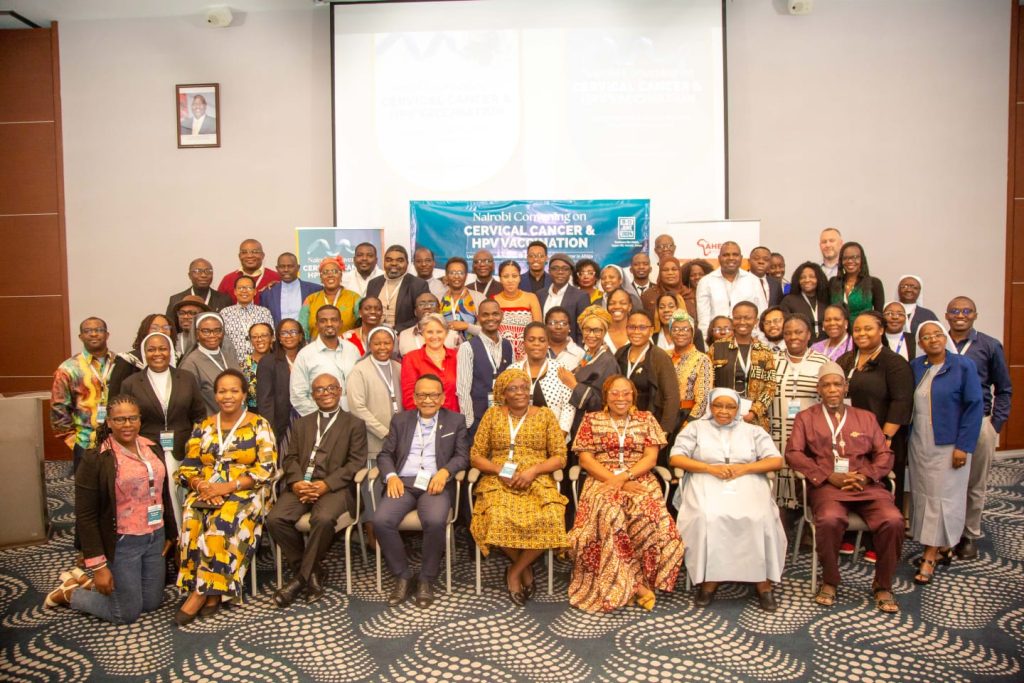255 Views
The participants of the Nairobi Cervical Cancer Elimination and HPV Vaccination
Convening, representing a diverse group of faith leaders, health professionals and experts, health and community advocates, as well as policy makers, convened in Nairobi for a three days event under the theme “Uniting Faith and Science against Cervical Cancer.”
Worldwide governments have committed to the ambition to eliminate cervical cancer – with the first step of reaching the WHO 90:70:90 targets by the year 2030. Africa can benefit most with this action towards a cervical cancer free Africa.
Recognizing the devastating impact of cervical cancer on the social fabric of our families and economies in Africa and the pain and suffering to African women, with approximately 126,000 new cases and 81,000 deaths annually (Globocan),
In addition the participants are dedicated in supporting the implementation of the current multi-faceted strategies across the life course that emphasizes the critical components of behavioral change communication, HPV vaccination (our youth), HPV screening (our women), treatment, palliative care and survivorship (our patients).
Acknowledging the current underutilization of these health services due to various cultural, logistical, and informational barriers, emphasizing the powerful influence of faith leaders and communities in shaping health behaviors and decisions, Celebrating the collaborative spirit of this convening, which brought together a wide range of stakeholders to address the scourge of cervical cancer through dialogue. The participants of Nairobi Cervical Cancer Elimination and HPV Vaccination declare the following key outcomes and comments
Enhanced Collaborative Networks:
Established new partnerships and strengthened existing ones among faith-based organizations, health authorities, advocacy and community groups to enhance the reach and effectiveness of cervical cancer prevention efforts.
Capacity Building for Faith Leaders: Successfully conducted multiple sessions and workshops for faith leaders, equipping them with the necessary and relevant knowledge and resources to advocate effectively for behavioral change communication, HPV vaccination, HPV screening, treatment, palliative care and survivorship
Ramping Up Vaccination Efforts: A major focus of convening was to leverage the
resource of faith networks to significantly increase HPV vaccination rates. We are committed to expanding access to vaccines by enhancing public awareness to ensure widespread uptake.
Expanded Screening Initiatives: We resolved to utilize the resources of faith
networks and the influence of faith leaders to broaden behavioral change activities, screening initiatives across the continent, employing advanced diagnostic technologies and improving infrastructure to reach remote and underserved areas. Collaborative
efforts with governments, national and international health organizations will help make screening a routine part of women’s healthcare.
Strengthening service delivery and guidelines: Our discussions highlighted the urgent need to enhance access to treatment protocols for pre-cervical and cervical cancer. This includes upgrading the capabilities of local health facilities, offering continuous training to healthcare professionals, and ensuring the availability of essential medical supplies and equipment for effective treatment.
Policy Engagement and Advocacy: We have proposed strategic discussions with policy makers to advocate for comprehensive cervical cancer care policies that support the implementation of advanced behavioral change communication, HPV vaccination, HPV screening, treatment, palliative care and survivorship in line with the WHO 90-70-90 targets.
Intergrated Sustainable Healthcare Models: We recommended sustainable and healthcare models that incorporate behavioral change communication, HPV
vaccination, HPV screening, treatment, palliative care and survivorship into primary healthcare systems, ensuring lifelong access to these critical services for girls and women (as well as boys going forward).
Community Engagement and Education: We are dedicated to engaging communities and increasing public awareness about the importance of behavioral change communication, HPV vaccination, HPV screening, treatment, palliative care and survivorship. We have developed and agreed upon a series of culturally sensitive advocacy strategies tailored to the unique needs and perspectives of various African communities, aiming to increase participation and vaccine and screening uptake. Educational programs and community workshops have been planned to dispel myths and stigma associated with cervical cancer.
Monitoring and Evaluation: A framework for ongoing monitoring and evaluation has been established to assess the effectiveness of the strategies implemented for behavioral change communication, HPV vaccination, HPV screening, treatment, palliative care and survivorship. This will allow for continuous improvement based on real-time data and feedback from the participating regions.
Resolution to Sustain Momentum: We resolved to maintain the momentum
generated during this convening through regular follow-up meetings and
communications among all stakeholders.
“As we move forward from this convening, we are energized and committed to continuing our efforts to combat cervical cancer through increased HPV vaccination rates, enhanced screening, robust treatment protocols and effective public health strategies”.
Together, we strive towards a future where cervical cancer no longer poses a significant threat to the health and well-being of women in Africa.
By Ann Nyambura







More Stories
George Wachiuri: Vipingo Prime Offers Investors a Piece of Coastal Paradise
BNI Kenya to Host Exclusive Business Growth Conference with World-Renowned Business Coach, Phil Berg
TCL Launches Massive 115-Inch TV in Kenya, Redefining Home Viewing